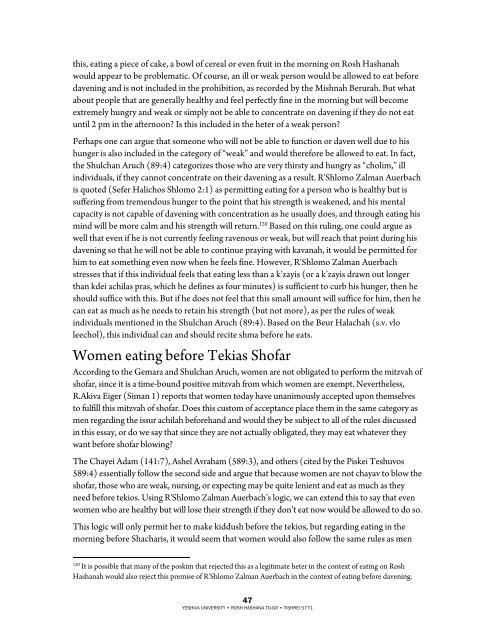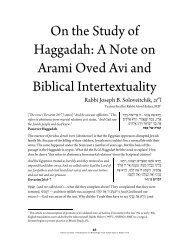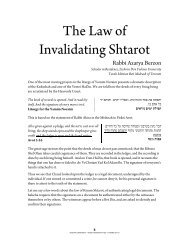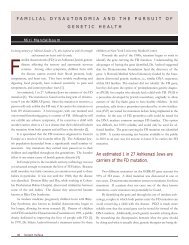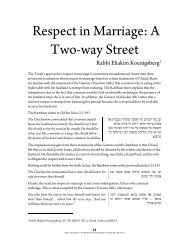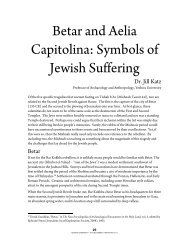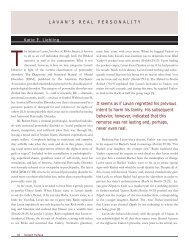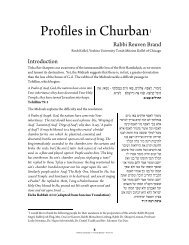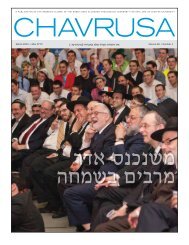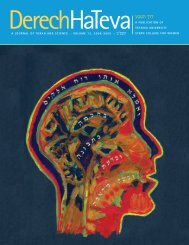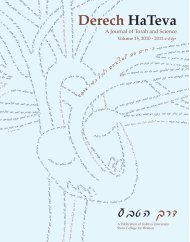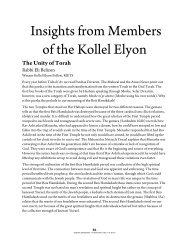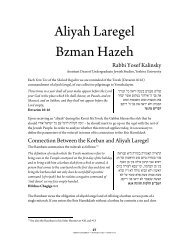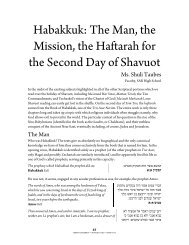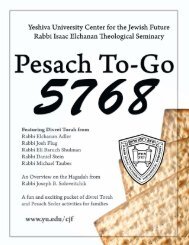YESHIVA UNIVERSITY • ROSH HASHANA TO-GO ... - YUTorah.org
YESHIVA UNIVERSITY • ROSH HASHANA TO-GO ... - YUTorah.org
YESHIVA UNIVERSITY • ROSH HASHANA TO-GO ... - YUTorah.org
You also want an ePaper? Increase the reach of your titles
YUMPU automatically turns print PDFs into web optimized ePapers that Google loves.
this, eating a piece of cake, a bowl of cereal or even fruit in the morning on Rosh Hashanah<br />
would appear to be problematic. Of course, an ill or weak person would be allowed to eat before<br />
davening and is not included in the prohibition, as recorded by the Mishnah Berurah. But what<br />
about people that are generally healthy and feel perfectly fine in the morning but will become<br />
extremely hungry and weak or simply not be able to concentrate on davening if they do not eat<br />
until 2 pm in the afternoon? Is this included in the heter of a weak person?<br />
Perhaps one can argue that someone who will not be able to function or daven well due to his<br />
hunger is also included in the category of “weak” and would therefore be allowed to eat. In fact,<br />
the Shulchan Aruch (89:4) categorizes those who are very thirsty and hungry as “cholim,” ill<br />
individuals, if they cannot concentrate on their davening as a result. R'Shlomo Zalman Auerbach<br />
is quoted (Sefer Halichos Shlomo 2:1) as permitting eating for a person who is healthy but is<br />
suffering from tremendous hunger to the point that his strength is weakened, and his mental<br />
capacity is not capable of davening with concentration as he usually does, and through eating his<br />
mind will be more calm and his strength will return. 120 Based on this ruling, one could argue as<br />
well that even if he is not currently feeling ravenous or weak, but will reach that point during his<br />
davening so that he will not be able to continue praying with kavanah, it would be permitted for<br />
him to eat something even now when he feels fine. However, R'Shlomo Zalman Auerbach<br />
stresses that if this individual feels that eating less than a k’zayis (or a k’zayis drawn out longer<br />
than kdei achilas pras, which he defines as four minutes) is sufficient to curb his hunger, then he<br />
should suffice with this. But if he does not feel that this small amount will suffice for him, then he<br />
can eat as much as he needs to retain his strength (but not more), as per the rules of weak<br />
individuals mentioned in the Shulchan Aruch (89:4). Based on the Beur Halachah (s.v. vlo<br />
leechol), this individual can and should recite shma before he eats.<br />
Women eating before Tekias Shofar<br />
According to the Gemara and Shulchan Aruch, women are not obligated to perform the mitzvah of<br />
shofar, since it is a time-bound positive mitzvah from which women are exempt. Nevertheless,<br />
R.Akiva Eiger (Siman 1) reports that women today have unanimously accepted upon themselves<br />
to fulfill this mitzvah of shofar. Does this custom of acceptance place them in the same category as<br />
men regarding the issur achilah beforehand and would they be subject to all of the rules discussed<br />
in this essay, or do we say that since they are not actually obligated, they may eat whatever they<br />
want before shofar blowing?<br />
The Chayei Adam (141:7), Ashel Avraham (589:3), and others (cited by the Piskei Teshuvos<br />
589:4) essentially follow the second side and argue that because women are not chayav to blow the<br />
shofar, those who are weak, nursing, or expecting may be quite lenient and eat as much as they<br />
need before tekios. Using R'Shlomo Zalman Auerbach’s logic, we can extend this to say that even<br />
women who are healthy but will lose their strength if they don’t eat now would be allowed to do so.<br />
This logic will only permit her to make kiddush before the tekios, but regarding eating in the<br />
morning before Shacharis, it would seem that women would also follow the same rules as men<br />
120 It is possible that many of the poskim that rejected this as a legitimate heter in the context of eating on Rosh<br />
Hashanah would also reject this premise of R'Shlomo Zalman Auerbach in the context of eating before davening.<br />
47<br />
<strong>YESHIVA</strong> <strong>UNIVERSITY</strong> <strong>•</strong> <strong>ROSH</strong> <strong>HASHANA</strong> <strong>TO</strong>-<strong>GO</strong> <strong>•</strong> TISHREI 5771


